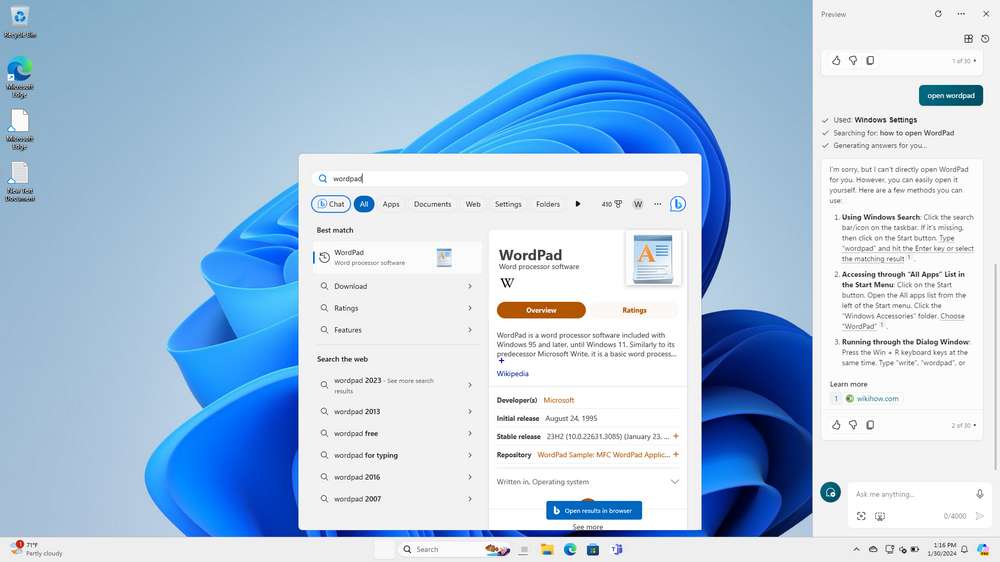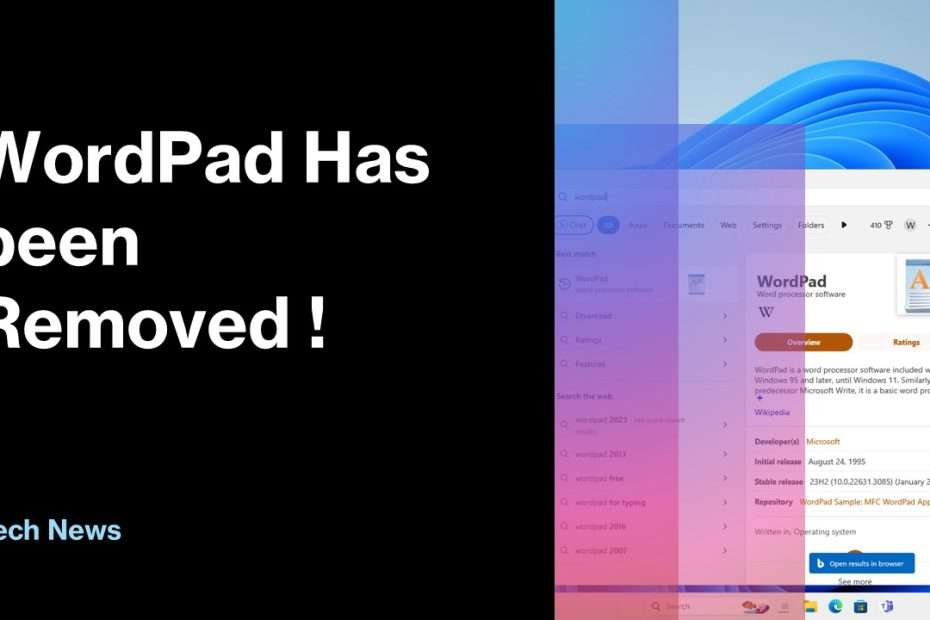In the recent preview build (26040) for Windows 11’s Canary Channel, Microsoft has continued its removal of legacy software by deleting WordPad from existing installs. This move follows the earlier decision to exclude WordPad from new OS installations, a change that was initially announced in September 2023. The gradual phasing out of WordPad, a legacy word processor that debuted with Windows 95, may not come as a surprise to Microsoft Insiders familiar with the company’s deprecation plans. While WordPad served as an enhanced version of Notepad, it was never a full-fledged word processor, and its removal reflects Microsoft’s ongoing efforts to streamline and modernize the Windows operating system.
The removal of WordPad might evoke nostalgia for users who have been accustomed to its presence since the early days of Windows. However, Microsoft’s decision aligns with the broader trend of focusing on more capable and feature-rich applications, such as Microsoft Word, for serious word processing tasks. As technology advances, the company aims to provide users with modern and efficient tools, and the removal of legacy software like WordPad is a step towards maintaining a more streamlined and contemporary Windows experience.
In the realm of office productivity software, Microsoft Word remains a prominent choice, offering a robust set of features. However, it’s essential to recognize that Word is not the sole contender in this field. LibreOffice, a widely embraced and free alternative, has gained popularity among millions of users. While Microsoft Office is a familiar choice, the availability of free and versatile options like LibreOffice might be worth considering, especially for those who appreciate cost-effective solutions without compromising functionality.
For users who prefer to stick with Microsoft Office and are in search of a budget-friendly option, Office 2019 Professional Plus presents itself as an attractive choice. Currently priced at under $30, this version provides users with the latest features and capabilities. The affordability coupled with a seamless installation and activation process, as experienced by users like myself during a recent PC build, makes Office 2019 Professional Plus an appealing alternative for those looking for a newer version of the Office suite.
The Canary Channel serves as a testing ground for Windows Insiders, offering them the opportunity to explore the latest features that are still in the developmental stage. This channel is designed for enthusiasts who want to experience cutting-edge additions to the Windows operating system before they are released to the general public. Notably, the features available in the Canary Channel can include significant updates that require extended development and testing periods, such as substantial alterations to the Windows kernel and the introduction of new application programming interfaces (APIs). By participating in the Canary Channel, users can actively contribute to the refinement of these features by providing valuable feedback to Microsoft, ensuring a smoother and more polished experience for the broader user base in subsequent releases.
Insiders who engage with the Canary Channel play a crucial role in the evolution of Windows, assisting in the identification and resolution of potential issues and providing insights into user experience. The early access to features that demand longer lead times before their official release allows Insiders to be at the forefront of innovation, gaining insights into the future direction of the Windows operating system. This collaborative process between Microsoft and its Insider community helps ensure that Windows updates are not only feature-rich but also stable and reliable when eventually rolled out to all users.

In the Canary Channel, Microsoft emphasizes that certain features tested by users may not ultimately make it to the final release, underscoring the experimental nature of this environment. This channel serves as a playground for Windows enthusiasts to explore and provide feedback on features that are in the early stages of development. Microsoft acknowledges that some features may undergo extensive scrutiny before being incorporated into a consumer release, ensuring that only well-vetted and polished additions make their way to the broader user base. Alongside this experimental approach, Microsoft provides limited documentation in the Canary Channel, focusing on the most significant and impactful known issues. This strategy aims to keep users informed about potential challenges while also encouraging them to actively participate in refining the Windows experience.
As for the fate of WordPad in the consumer version of Windows 11, Microsoft has not disclosed a specific timeline for its removal. However, given the recent developments in the Canary Channel, where WordPad has been removed from existing installs, there is a growing expectation that the legacy word processor might be phased out soon. The anticipation of WordPad’s removal aligns with Microsoft’s broader strategy of streamlining and modernizing its operating system, retiring legacy features in favor of more advanced alternatives. Users and enthusiasts alike are keenly observing these changes, awaiting further updates on the evolution of Windows 11 and the company’s ongoing efforts to enhance the user experience.
Maybe you liked other interesting articles?

